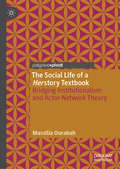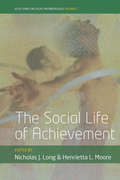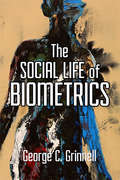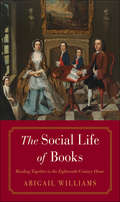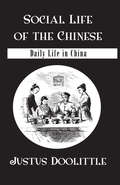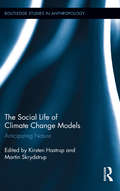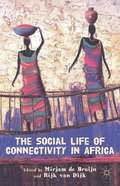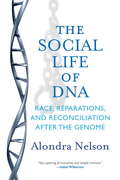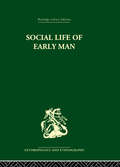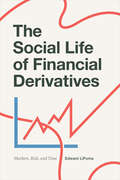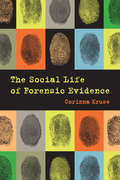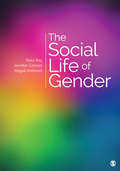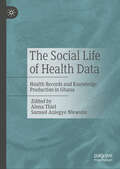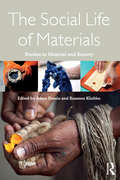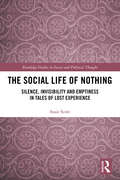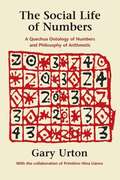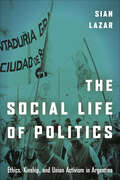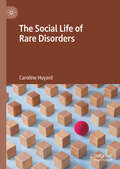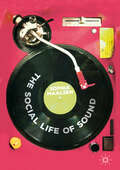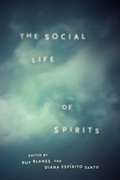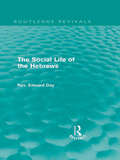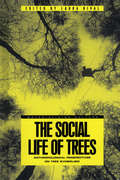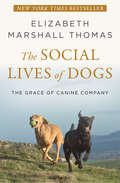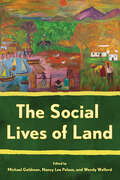- Table View
- List View
The Social Life of a Herstory Textbook: Bridging Institutionalism and Actor-Network Theory
by Massilia OurabahThis book studies the possibility for feminist educational change by examining a case study on the social life of a French gender and women history textbook. Massilia Ourabah opens a unique and timely dialogue between two antagonistic sociological trends: institutionalism and actor-network theory (ANT), and more specifically the inhabited institution approach and the sociology of translation. The structure of the book is dual: it offers one version of the case study grounded in the institutionalist approach, and another version grounded in the translational approach. The goal is to show that through the introduction of institutional elements and the rejection of some of ANT’s strongest assumptions, the critical value of ANT can be restored and prove a useful framework for studying sociomaterial networks in education. The book also engages with feminist pedagogy and discusses the implications of the case study for the prospect of a more gender-balanced educational curriculum.
The Social Life of Achievement
by Nicholas J. Long Henrietta L. MooreWhat happens when people "achieve"? Why do reactions to "achievement" vary so profoundly? And how might an anthropological study of achievement and its consequences allow us to develop a more nuanced model of the motivated agency that operates in the social world? These questions lie at the heart of this volume. Drawing on research from Southeast Asia, Europe, the United States, and Latin America, this collection develops an innovative framework for explaining achievement's multiple effects-one which brings together cutting-edge theoretical insights into politics, psychology, ethics, materiality, aurality, embodiment, affect and narrative. In doing so, the volume advances a new agenda for the study of achievement within anthropology, emphasizing the significance of achievement as a moment of cultural invention, and the complexity of "the achiever" as a subject position.
The Social Life of Biometrics
by George C GrinnellIn The Social Life of Biometrics, biometrics is loosely defined as a discrete technology of identification that associates physical features with a legal identity. Author George Grinnell considers the social and cultural life of biometrics by examining what it is asked to do, imagined to do, and its intended and unintended effects. As a human-focused account of technology, the book contends that biometrics needs to be understood as a mode of thought that informs how we live and understand one another; it is not simply a neutral technology of identification. Placing our biometric present in historical and cultural perspective, The Social Life of Biometrics examines a range of human experiences of biometrics. It features individual stories from locations as diverse as Turkey, Canada, Qatar, Six Nations territory in New York State, Iraq, the skies above New York City, a university campus and Nairobi to give cultural accounts of identification and look at the ongoing legacies of our biometric ambitions. It ends by considering the ethics surrounding biometrics and human identity, migration, movement, strangers, borders, and the nature of the body and its coherence. How has biometric thought structured ideas about borders, race, covered faces, migration, territory, citizenship, and international responsibility? What might happen if identity was less defined by the question of “who’s there?” and much more by the question “how do you live?”
The Social Life of Books: Reading Together in the Eighteenth-Century Home (The Lewis Walpole Series in Eighteenth-Century Culture and History)
by Abigail Williams&“A lively survey…her research and insights make us conscious of how we, today, use books.&”—John Sutherland, The New York Times Book Review Two centuries before the advent of radio, television, and motion pictures, books were a cherished form of popular entertainment and an integral component of domestic social life. In this fascinating and vivid history, Abigail Williams explores the ways in which shared reading shaped the lives and literary culture of the eighteenth century, offering new perspectives on how books have been used by their readers, and the part they have played in middle-class homes and families. Drawing on marginalia, letters and diaries, library catalogues, elocution manuals, subscription lists, and more, Williams offers fresh and fascinating insights into reading, performance, and the history of middle-class home life. &“Williams&’s charming pageant of anecdotes…conjures a world strikingly different from our own but surprisingly similar in many ways, a time when reading was on the rise and whole worlds sprang up around it.&”—TheWashington Post
Social Life Of The Chinese: With Some Account Of The Religious, Governmental, Educational, And Business Customs And Opinions. With Special But Not Exclusive Reference To Fuchchau
by DoolittleFirst Published in 2005. Routledge is an imprint of Taylor & Francis, an informa company.
The Social Life of Climate Change Models: Anticipating Nature (Routledge Studies in Anthropology #8)
by Kirsten Hastrup and Martin SkrydstrupDrawing on a combination of perspectives from diverse fields, this volume offers an anthropological study of climate change and the ways in which people attempt to predict its local implications, showing how the processes of knowledge making among lay people and experts are not only comparable but also deeply entangled. Through analysis of predictive practices in a diversity of regions affected by climate change – including coastal India, the Cook Islands, Tibet, and the High Arctic, and various domains of scientific expertise and policy making such as ice core drilling, flood risk modelling, and coastal adaptation – the book shows how all attempts at modelling nature’s course are deeply social, and how current research in "climate" contributes to a rethinking of nature as a multiplicity of modalities that impact social life.
The Social Life of Connectivity in Africa
by Mirjam De Bruijn Rijk Van DijkThe rapid increase in adoption of modern 'connective' technologies like the mobile phone has reshaped the social landscape of Africa. This book examines the myriad possibilities that the post-global moment offers African societies to develop and to relate, offering profound new insights into the processes of globalization.
The Social Life of DNA
by Alondra NelsonThe unexpected story of how genetic testing is affecting race in AmericaWe know DNA is a master key that unlocks medical and forensic secrets, but its genealogical life is both revelatory and endlessly fascinating. Tracing genealogy is now the second-most popular hobby amongst Americans, as well as the second-most visited online category. This billion-dollar industry has spawned popular television shows, websites, and Internet communities, and a booming heritage tourism circuit.The tsunami of interest in genetic ancestry tracing from the African American community has been especially overwhelming. In The Social Life of DNA, Alondra Nelson takes us on an unprecedented journey into how the double helix has wound its way into the heart of the most urgent contemporary social issues around race.For over a decade, Nelson has deeply studied this phenomenon. Artfully weaving together keenly observed interactions with root-seekers alongside illuminating historical details and revealing personal narrative, she shows that genetic genealogy is a new tool for addressing old and enduring issues. In The Social Life of DNA, she explains how these cutting-edge DNA-based techniques are being used in myriad ways, including grappling with the unfinished business of slavery: to foster reconciliation, to establish ties with African ancestral homelands, to rethink and sometimes alter citizenship, and to make legal claims for slavery reparations specifically based on ancestry.Nelson incisively shows that DNA is a portal to the past that yields insight for the present and future, shining a light on social traumas and historical injustices that still resonate today. Science can be a crucial ally to activism to spur social change and transform twenty-first-century racial politics. But Nelson warns her readers to be discerning: for the social repair we seek can't be found in even the most sophisticated science. Engrossing and highly original, The Social Life of DNA is a must-read for anyone interested in race, science, history and how our reckoning with the past may help us to chart a more just course for tomorrow.From the Hardcover edition.
Social Life of Early Man (Viking Fund Publications In Anthropology #No. 31)
by Sherwood L WashburnAttempting to reconstruct the life of early societies, particular emphasis is laid upon social behaviour among primates, as well as approaches from ethnology, prehistoric archaeology, geography, genetics, human stress biology and psychology. First published in 1962.
The Social Life of Financial Derivatives: Markets, Risk, and Time
by Edward LipumaIn The Social Life of Financial Derivatives Edward LiPuma theorizes the profound social dimensions of derivatives markets and the processes, rituals, and belief systems that drive them. In response to the 2008 financial crisis and drawing on his experience trading derivatives, LiPuma outlines how they function as complex devices that organize speculative capital as well as the ways derivative-driven capitalism not only produces the conditions for its own existence, but also penetrates the fabric of everyday life. Framing finance as a form of social life and highlighting the intrinsically social character of financial derivatives, LiPuma deepens our understanding of derivatives so that we may someday use them to serve the public well-being.
The Social Life of Forensic Evidence
by Corinna KruseIn The Social Life of Forensic Evidence, Corinna Kruse provides a major contribution to understanding forensic evidence and its role in the criminal justice system. Arguing that forensic evidence can be understood as a form of knowledge, she reveals that each piece of evidence has a social life and biography. Kruse shows how the crime scene examination is as crucial to the creation of forensic evidence as laboratory analyses, the plaintiff, witness, and suspect statements elicited by police investigators, and the interpretations that prosecutors and defense lawyers bring to the evidence. Drawing on ethnographic data from Sweden and on theory from both anthropology and science and technology studies, she examines how forensic evidence is produced and how it creates social relationships as cases move from crime scene to courtroom. She demonstrates that forensic evidence is neither a fixed entity nor solely material, but is inseparably part of and made through particular legal, social, and technological practices.
The Social Life of Gender (SAGE Sociological Essentials Series)
by Raka R. Ray Jennifer Dawn Carlson Abigail L. AndrewsThe Social Life of Gender provides a comprehensive approach to gender as an organizing principle of institutions, history, and unequal interpersonal relations. This new title will develop students’ capacity to use gender analysis to question social life more broadly, by presenting a critical sociology based on the unique insights gleaned from the study of gender. Through bold, concise, and intellectually generative writing, the authors explore culture, geopolitics, and the economy, providing students with a succinct, accessible, and critical grasp of core debates in the sociology of gender.
The Social Life of Gender (SAGE Sociological Essentials Series)
by Raka R. Ray Jennifer Dawn Carlson Abigail L. AndrewsThe Social Life of Gender provides a comprehensive approach to gender as an organizing principle of institutions, history, and unequal interpersonal relations. This new title will develop students’ capacity to use gender analysis to question social life more broadly, by presenting a critical sociology based on the unique insights gleaned from the study of gender. Through bold, concise, and intellectually generative writing, the authors explore culture, geopolitics, and the economy, providing students with a succinct, accessible, and critical grasp of core debates in the sociology of gender.
The Social Life of Health Data: Health Records and Knowledge Production in Ghana
by Alena Thiel Samuel Aniegye NtewusuThis book takes the contemporary moment of digital health infrastructuring in Ghana as a starting point to examine the genealogies of oral, paper-based and digital forms of knowledge production about health. In view of this multiplicity of forms, the chapters adopt a broad definition of health data that encompasses databases, statistics as well as oral and written records and reports about health. In addition to close historiographic insights into the interactions of indigenous and colonial ways of organising knowledge around health, the chapters explore contemporary ways in which medical professionals are mobilized or potentially demobilized by the standards, methods and calculative devices that accompany the increasing production of health data. The authors show that the contemporary hype around the datafication of health is neither new nor exceptional, but instead needs to be read in broader historical perspective. Through its unique combination of historical, sociological and ethnographic methods, the book shows that the regulation and standardization of health produces both mobilizations and demobilizations, as well as appropriations and resistances.
The Social Life of Materials: Studies in Materials and Society (Criminal Practice Ser.)
by Adam DrazinMaterials play a central role in society. Beyond the physical and chemical properties of materials, their cultural properties have often been overlooked in anthropological studies: finished products have been perceived as ‘social’ yet the materials which comprise them are considered ‘raw’ or natural’. The Social Life of Materials proposes a new perspective in this interdisciplinary field. Diverting attention from the consumption of objects, the book looks towards the properties of materials and how these exist through many transformations in a variety of cultural contexts.Human societies have always worked with materials. However, the customs and traditions surrounding this differ according to the place, the time and the material itself. Whether or not the material is man-made, materials are defined by social intervention. Today, these constitute one of the most exciting areas of global scientific research and innovation, harboring the potential to act as key vehicles of change in the world. But this ‘materials revolution’ has complex social implications. Smart materials are designed to anticipate our actions and needs, yet we are increasingly unable to apprehend the composite materials which comprise new products.Bringing together ethnographic studies of cultures from around the world, this collection explores the significance of materials by moving beyond questions of what may be created from them. Instead, the text argues that the materials themselves represent a shifting ground around which relationships, identities and powers are constantly formed and dissolved in the act of making and remaking.
The Social Life of Nothing: Silence, Invisibility and Emptiness in Tales of Lost Experience (Routledge Studies in Social and Political Thought)
by Susie ScottNothing really matters. All the things that we do not do, have or become in our lives can be important in shaping self-identity. From jobs turned down to great loves lost, secrets kept and truths untold, people missed and souls unborn, we understand ourselves through other, unlived lives that are imaginatively possible. This book explores the realm of negative social phenomena – no-things, no-bodies, non-events and no-where places – that lies behind the mirror of experience. Taking a symbolic interactionist perspective, the author argues that these objects are socially produced, emerging from and negotiated through our relationships with others. Nothing is interactively accomplished in two ways, through social acts of commission and omission. Existentialism and phenomenology encourage us to understand more deeply the subjective experience of nothing; this can be pursued through conscious meaning-making and reflexive self-awareness. The Social Life of Nothing is a thought-provoking book that will appeal to scholars across the social sciences, arts and humanities, but its message also resonates with the interested general reader.
The Social Life of Numbers: A Quechua Ontology of Numbers and Philosophy of Arithmetic
by Gary UrtonUnraveling all the mysteries of the khipu -the knotted string device used by the Inka to record both statistical data and narrative accounts of myths, histories, and genealogies-will require an understanding of how number values and relations may have been used to encode information on social, familial, and political relationships and structures. This is the problem Gary Urton tackles in his pathfinding study of the origin, meaning, and significance of numbers and the philosophical principles underlying the practice of arithmetic among Quechua-speaking peoples of the Andes. Based on fieldwork in communities around Sucre, in south-central Bolivia, Urton argues that the origin and meaning of numbers were and are conceived of by Quechua-speaking peoples in ways similar to their ideas about, and formulations of, gender, age, and social relations. He also demonstrates that their practice of arithmetic is based on a well-articulated body of philosophical principles and values that reflects a continuous attempt to maintain balance, harmony, and equilibrium in the material, social, and moral spheres of community life.
The Social Life of Politics: Ethics, Kinship, and Union Activism in Argentina
by Sian LazarA central motor of Argentine historical and political development since the early twentieth century, unions have been the site of active citizenship in both political participation and the distribution of social, economic, political, and cultural rights. What brings activists to Argentine unions and what gives these unions their remarkable strength? The Social Life of Politics examines the intimate, personal, and family dimensions of two political activist groups: the Union of National Civil Servants (UPCN) and the Association of State Workers (ATE). These two unions represent distinct political orientations within Argentina's broad, vibrant labor movement: the UPCN identifies as predominantly Peronist, disciplined, and supportive of incumbent government, while the ATE prides itself on its democratic, horizontal approach and relative autonomy from the electoral process. Sian Lazar examines how activists in both unions create themselves as particular kinds of militants and forms of political community. The Social Life of Politics places the lived experience of political activism into historical relief and shows how ethics and family values deeply inform the process by which political actors are formed, understood, and joined together through collectivism.
The Social Life of Rare Disorders
by Caroline HuyardThis book is the first comprehensive study of rare disorders from a historical, political, and social perspective. It is estimated that around 300 million people worldwide live with a rare disorder today. What do patients and associations concerned by one of the 7,000 known rare diseases have in common, and what does rarity mean to them? How did rare disorders become a mainstream category in public health policy? To answer these questions, Caroline Huyard traces the history, over more than 50 years, of medical treatments for one particular disease, and that of the orphan drug status in the United States and in Europe. The book shows that public authorities had a much greater role than biomedicine in turning rare disorders into a public health problem. A comparison of patients' experiences of 6 rare diseases as well as the activities of 8 associations in France underlines the importance of isolation and care for patients on the one hand, and the role of stakeholders’ participation for associations on the other hand. This book is essential reading for researchers and students interested in contemporary healthcare systems and topics related to public policies on emerging issues, the industrialisation and regulation of medicine, the concept of care, and the governance of patient organisations.
The Social Life of Sound
by Sophia MaalsenThe Social Life of Sounds argues for the agency of sounds and music and the acceleration of their social lives in the Digital Age. Drawing upon research with composers, producers, record collectors, DJs and record labels, the book problematises the notion of artistic authorship as it is framed in Western systems of property. Acknowledging that ‘things’ – sounds, samples, and recorded music – and people are co-constituted and that personhood is distributed through things and their reuse, Maalsen makes a case for understanding sound as multibiographical and challenges the possessive individual that is the basis of artistic copyright.
The Social Life of Spirits
by Ruy Blanes Diana Espírito SantoSpirits can be haunters, informants, possessors, and transformers of the living, but more than anything anthropologists have understood them as representations of something else—symbols that articulate facets of human experience in much the same way works of art do. The Social Life of Spirits challenges this notion. By stripping symbolism from the way we think about the spirit world, the contributors of this book uncover a livelier, more diverse environment of entities—with their own histories, motivations, and social interactions—providing a new understanding of spirits not as symbols, but as agents. The contributors tour the spiritual globe—the globe of nonthings—in essays on topics ranging from the Holy Ghost in southern Africa to spirits of the “people of the streets” in Rio de Janeiro to dragons and magic in Britain. Avoiding a reliance on religion and belief systems to explain the significance of spirits, they reimagine spirits in a rich network of social trajectories, ultimately arguing for a new ontological ground upon which to examine the intangible world and its interactions with the tangible one.
The Social Life of the Hebrews (Routledge Revivals)
by Edward DayFirst published in 1901, this study of the social life of the Hebrews considers both the time of the judges and the time of the monarchy. Written in a popularly scientific style, designed to appeal to students of ancient Middle East and biblical history as well as the general reader, this work details the social life and history of allied Semitic races, covering the period of time from the settlement of Canaan to the breakup of the Northern Kingdom in 722 BC.
The Social Life of Trees: Anthropological Perspectives on Tree Symbolism (Materializing Culture Ser.)
by Laura RivalThe passionate response of the British public to the Newbury Bypass is a revealing measure of how strongly people feel about trees and the environment. Similarly, in the United States, the giant sequoia of California is an enduring national symbol that inspires intense feelings. As rainforests are sacrificed to the interests of multi-national corporations and traditional ways of life disappear, the status of forests, the cultural significance of trees, and the impact of conservation policies are subjects that have inspired intense engagement. Why do people feel so strongly about trees? With this explosion of interest in environmental issues, a serious study of what trees mean to people has long been overdue. This interdisciplinary book responds to this need by providing the first cross-cultural analysis of tree symbolism. Drawing on rich case studies, contributors explore the processes through which trees are used as metaphors of identity and continuity. Political struggles over forest resources feature prominently, and the perceptions of trees in various cultures provide telling insights into the ways in which human societies conceptualize nature.As well as being a major contribution to the field of symbolic anthropology, this comprehensive study will be essential reading for students in a wide range of courses and for anyone with a keen interest in the politics of ecology, the occult and neo-paganism, and the history and sociology of environmentalism in its widest sense.
The Social Lives of Dogs: The Grace of Canine Company (G. K. Hall Nonfiction Ser.)
by Elizabeth Marshall ThomasFrom the bestselling author of The Hidden Life of Dogs and The Tribe of Tiger comes a groundbreaking work on canine consciousness and how dogs become family Moving from Virginia to New Hampshire is a change not only for Elizabeth Marshall Thomas and her husband, but also for their three elderly dogs. A classically trained anthropologist, Thomas observes the way in which Suessi, Fatima, and Inookshook acclimate to a new house and new adventure. Over the years, as the dogs grow older and new ones are taken in, Thomas analyzes their behavior and personalities. What makes dogs react uniformly to certain situations? To what extent do they comprehend human dialogue? With every sniff of the dogs' noses and every wag of their tails, Thomas builds an impressive understanding of canine reaction and affection, and of the ways dogs support those they regard as one of their own.
The Social Lives of Land (Cornell Series on Land: New Perspectives on Territory, Development, and Environment)
by Goldman Et Al.From the shaping of new homelands in the Cherokee Nation to the export of sand from Cambodia to shore up urban expansion in Singapore, The Social Lives of Land reveals the dynamics of contemporary social and political change. The editors of this volume bring together contributions from across multiple disciplines and geographic locations. The contributions showcase novel theoretical and empirical insights, analyzing how people are living on, with, and from their land. From Mozambique to India, Indonesia, Ecuador, and the colonial United States, the scholars in this collection uncover histories and retell stories with a focus on the lived experiences of rural and urban land dispossession and repossession.Contributors: Kati Álvarez, Clint Carroll, Flora Lu, Richard Mbunda, Gregg Mitman, Paul Nadasdy, Robert Nichols, Andrew Ofstehage, Laura Schoenberger, Kirsteen Shields, Emmanuel Sulle, Erik Swyngedouw, Gabriela Valdivia, Katherine Verdery, Callum Ward, Ciara Wirth, Emmanuel King Urey Yarkpawolo
